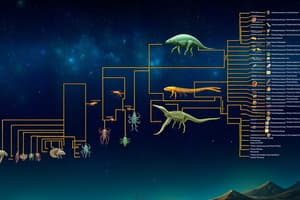Podcast
Questions and Answers
What is the primary focus of social studies?
What is the primary focus of social studies?
- Investigating historical events
- Studying living organisms
- Exploring mathematical concepts
- Understanding how societies evolve and function (correct)
Which of the following is NOT a subfield of social studies mentioned in the text?
Which of the following is NOT a subfield of social studies mentioned in the text?
- Political Science
- Economics
- Civics
- Zoology (correct)
What aspect of biology does molecular biology primarily focus on?
What aspect of biology does molecular biology primarily focus on?
- Study of ecosystems
- Study of animals
- Study of trees and plants
- Genes and DNA (correct)
Which subject area is commonly associated with understanding the laws of motion and energy?
Which subject area is commonly associated with understanding the laws of motion and energy?
Why is mathematics considered a foundational building block of education?
Why is mathematics considered a foundational building block of education?
Which subject is described as providing insights into emerging technologies and applications that motivate students to pursue STEM careers?
Which subject is described as providing insights into emerging technologies and applications that motivate students to pursue STEM careers?
Which branch of science allows students to understand how living systems function, evolve, and adapt?
Which branch of science allows students to understand how living systems function, evolve, and adapt?
Which subject is described as the universal toolkit for logical reasoning, problem solving, and abstract thought?
Which subject is described as the universal toolkit for logical reasoning, problem solving, and abstract thought?
Which science field involves students engaging with physical phenomena ranging from force interactions to electromagnetic fields?
Which science field involves students engaging with physical phenomena ranging from force interactions to electromagnetic fields?
Which subject is said to instill fundamental principles that help in understanding photosynthesis, DNA regulation, and ecosystem dynamics?
Which subject is said to instill fundamental principles that help in understanding photosynthesis, DNA regulation, and ecosystem dynamics?
Study Notes
Diving into Education Classes: Exploring Core Subjects
In today's classroom, four subject areas stand out as foundational building blocks of education. These disciplines—social studies, biology, physics, and mathematics—foster critical thinking skills while imparting valuable knowledge across various domains. Let's explore these subjects, uncovering what makes them essential components of any modern curriculum.
Social Studies
Social studies encompass history, geography, civics, economics, anthropology, psychology, and political science. Through this broad umbrella, students learn how societies have evolved over time, how governments operate, why economies thrive or struggle, and how people interact with each other and their environment. By delving into cultural, economic, historical, political, and spatial issues, social studies equips young minds with crucial problem-solving abilities. Historically, it has been recognized as one of the most important core academic subjects because of its ability to cultivate informed citizens capable of fostering positive change in our global community.
Biology
Biology is the study of living organisms—from single celled microbes all the way up to complex ecosystems. In this course, pupils investigate life from diverse perspectives, including botany, zoology, genetics, ecology, molecular biology, and physiology. At its core, biology instills fundamental principles that help us understand how living systems function, communicate, grow, reproduce, evolve, and adapt. This understanding enables students to make connections between everyday occurrences like photosynthesis driving food production, DNA regulating gene expression, or ecosystem dynamics shaping habitats. Furthermore, biological concepts often intersect with broader societal issues such as climate change, conservation, and public health initiatives, making biology an integral part of a well-rounded educational experience.
Physics
Physics, the natural science governing matter and motion, revolves around three main branches: mechanics, electricity & magnetism, and thermodynamics. Students discover the underlying laws of nature through experiments and deductive reasoning. As they engage with physical phenomena ranging from simple force interactions to complex electromagnetic fields, they acquire vital analytical skills, develop logic, and strengthen quantitative literacy. Moreover, physics provides unique insights into emerging technologies and applications, motivating students to pursue careers within STEM fields. For instance, by studying light waves in optics, students may gain inspiration to create cutting-edge photonics devices. Similarly, exploring kinetic energy could lead to innovations in renewable energy technology or automotive engineering.
Mathematics
Mathematics serves as the universal toolkit for logical reasoning, problem solving, and abstract thought. Pupils learn techniques to represent and analyze information using arithmetic, algebra, geometry, trigonometry, calculus, statistics, probability, and discrete math concepts. With mathematical training, students sharpen their mental agility, deepen their understanding of the world, improve their communication skills, and prepare themselves for success in scientific, technological, business, and personal spheres alike. Beyond learning specific algorithms and formulas, when taught effectively, mathematics exposes students to powerful models of logic and reason used throughout human civilization, dating back thousands of years.
Education classes featuring social studies, biology, physics, and mathematics serve to illuminate key aspects of the universe we inhabit; instilling curiosity, resilience, creativity, and adaptability. This integrated approach allows students to connect ideas, develop a deeper sense of wonderment, and ultimately become responsible and engaged members of society.
Studying That Suits You
Use AI to generate personalized quizzes and flashcards to suit your learning preferences.
Description
Delve into the foundational subjects of social studies, biology, physics, and mathematics that form the bedrock of education. Discover the significance of each discipline in fostering critical thinking skills, imparting valuable knowledge, and shaping informed citizens adept at navigating modern challenges.




